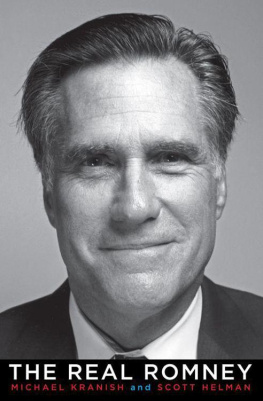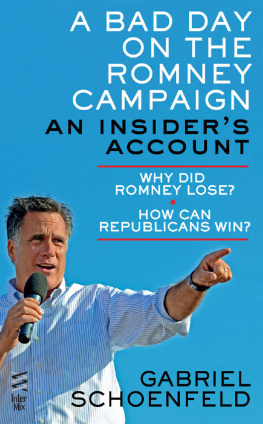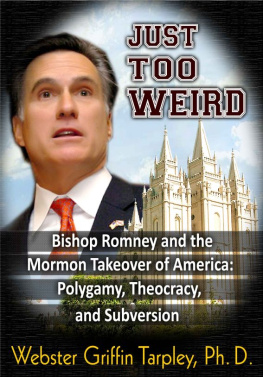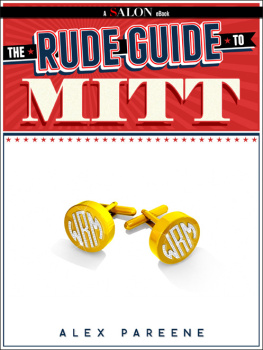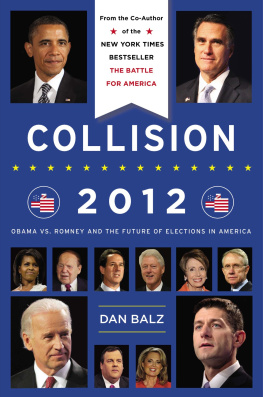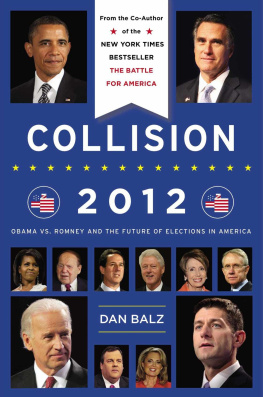The Real Romney
Michael Kranish and Scott Helman

www.harpercollins.com
Michael Kranish:
To the journalists of The Boston Globe .
Scott Helman:
To Jonas and Eli, and the rich lives that await them.
Contents
Praying for a Miracle
Following the Call
Outside the Fray
A Brush with Tragedy
Family Man, Church Man
The Moneymaker
Taking On an Icon
The Torch Is Lit
The CEO Governor
Health Care Revolutionary
A Right Turn on the Presidential Trail
Back into the Fire
The Real Romney was written by Scott Helman and Michael Kranish of The Boston Globe staff, and edited by Mark S. Morrow, the deputy managing editor who oversees the Sunday Globe and major news projects. It builds on the work of the many Globe staffers who have tracked Mitt Romneys life and career over the decades, including those who contributed to a landmark seven-part biographical series published as he launched his first presidential run. Among those critical contributors: Brian C. Mooney, a veteran investigative reporter, whose deep reporting on Romneys years as governor and his push for state health care reform was a critical resource; Beth Healy, a business reporter who brought expert reporting and vital sources to our analysis of Romneys years as a leveraged buyout specialist; Bob Hohler, a sports reporter who trained a sharp eye on Romneys turnaround of the Utah Olympics; Michael Paulson, the Globe s former religion reporter and now an editor at The New York Times , who was the first to trace Romneys missionary years in detail; Neil Swidey, a Sunday magazine staff writer who played a crucial writing and editing role in the 2007 series; and Peter S. Canellos, who edited the series as the papers Washington bureau chief and now leads its editorial page. Other key contributions to that series came from Globe staffers Stephanie Ebbert, Robert Gavin, and Sacha Pfeiffer (now an on-air host for WBUR radio). The authors are deeply indebted, and grateful, to them all.
W hen he finally enters the auditorium, they jump to their feet, the murmur crescendoing to a spirited ovation. Through a gauntlet of whoops, whistles, fist pumps, and camera flashes, he emerges, microphone in hand, his charcoal hair speckled with gray, wearing an easy smile as the warm reception washes over him. Lets go, Mitt! someone screams. He mildly protests the adulation, imploring everyone to sit down, to please sit down. On this balmy autumn day in New Hampshire, in a campaign being fought very much on his turf, Willard Mitt Romney is confident, serenely so. Hes an old hand at this now. Hes ditched the stiff suits for cuffed khakis, scrapped the elaborate stagecraft for a minimalist presentationjust a guy holding court at a modest town hall meeting, ready for anything from voters who feel entitled to this ritual of political intimacy. He opens with a patriotic riff, promising a campaign of American greatness. He wants everyone to know: Mitt Romney loves America, and he believes in its people.
It is a simple, Reaganesque anthem, served up to a Republican audience hungry for a credible, electable leader who will deny President Barack Obama a second term. Romneys whole demeanor, here at the center of this theater-in-the-round at Saint Anselm College in Manchester, New Hampshire, is meant to convey, beyond any doubt, that he is ready. If he could take over now, he would. Just give him the keys to the White House. Why wait? After all, hes been preparing for this momenthis momentall his life. Many politicians say that. Or have it said about them. In Mitt Romneys case, to a remarkable degree, it happens to be true.
He is, as he likes to say in debates, in speeches, and on the stump, a turnaround specialist running to lead a nation that desperately needs one. In his narrative, President Barack Obama has steered the country into a ditch, and Mitt Romney is the only one capable of yanking it out. Mr. Fix-it, reporting for duty. Hes already fixed his approach as a candidate, self-assured and savvy where he was often slipshod and self-defeating in 2008. He is, as one local politician tells him point-blank at Saint Anselm, a far stronger contender than he was four years ago, much more at home in a campaign centered on the economy. Last time, Romney looked like an actor playing a presidential candidate. This time, he seems like the real thing.
All around him on this day, mounted high on the walls of the colleges New Hampshire Institute of Politics, are imposing photos of men who have achieved what he has long dreamed about. Theres George H. W. Bush in a red jacket, standing with supporters near the ocean in Maine. Theres Bill Clinton on the tarmac beside Air Force One. Theres Jimmy Carter with Bill and Jeanne Shaheen, one of New Hampshires most famous political couples. But on these walls also hang reminders of the brutal selectivity of presidential politics, of the men whose reach came up short. Theres Bill Bradley shooting a basketball in a tweed coat and red tie. Theres the young Al Gore, in blue jeans and a barn jacket, on the doorstep of a man who is evidently not thrilled at the visit. And then, down a hallway in a quiet corner, is an even more poignant reminder that politics is a fickle business.
There, at eye level, in a simple black frame against a wood panel, hangs a campaign poster from the 1968 presidential bid of his father, George Romney, a Republican moderate who bowed out of the race Richard Nixon would go on to win. The poster, in keeping with the era, has a psychedelic feel, with the words I WANT ROMNEY IN 68 printed in a fun-house font that wouldnt be out of place on a Jimi Hendrix concert flyer. George is smiling broadly in the gray-and-white rendering of his handsome face, his teeth impossibly white and his hair helmetlike in its perfection. It is an image strangely in tune with the moment, an artifact of both inspiration and warning.
T his book is the first complete, independent biography of Mitt Romney, a man whose journey to national political fame is at once remarkable and thoroughly unsurprising. It would have been unthinkable to his ancestors just a few generations ago, yet countless people whose lives intersected with Romneys over the past seven decades have drawn the same conclusion: this man might just be president someday. The Real Romney , which draws on our many years tracking the man and his career for The Boston Globe , is an attempt to capture him in whole, to plumb the many chapters of his life for insight into his character, his worldview, his drive, and his contradictions.
It is the story of a man guided by his faith and firmly grounded in family. It is the story of a once marginal and feared religion, Mormonism, a brand of Christianity homemade in America that he and his forebears helped move to the mainstream. It is the story of the counterculture movement of the 1960s and the proudly square young man who found it all appalling. It is the story of the wildly lucrative world of private equity and leveraged buyouts, a world largely opaque to outsiders, in which wealth is built and concentrated in novel ways, sometimes at others expense. It is the story of an uneasy relationship between conviction and vaulting ambition and how political dreams can die when tactics outrun beliefs. And it is the story, of course, of a father and a son, George and Mitt Romney, and the ways in which their lives aligned and diverged.
George Romney remains, more than four decades after his own adventure in presidential politics and sixteen years after his death, a constant spiritual presence at his sons side. When a young girl asks Mitt Romney during the New Hampshire gathering what he would tell her class to make them want to be politicians, he deadpans at first, saying The answer is: nothing. Dont do it. Run as far as you can. But when he turns serious, he invokes the advice he says his father offered years ago: He said, Dont get into politics as your profession.... Get into the world of the real economy. And if someday youre able to make a contribution, do it. This is the essence of Romneys pitch, and it has been ever since his days as a deal maker in the 1980s and 1990s. Hes made his moneya mountain of it, in factand believes, as his father did, that he now owes a debt to the country that made a place for him.

